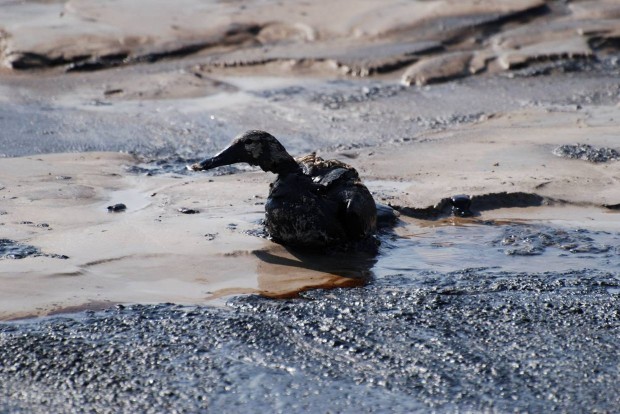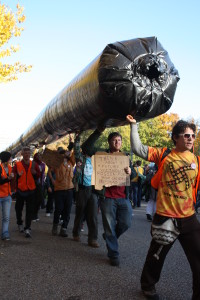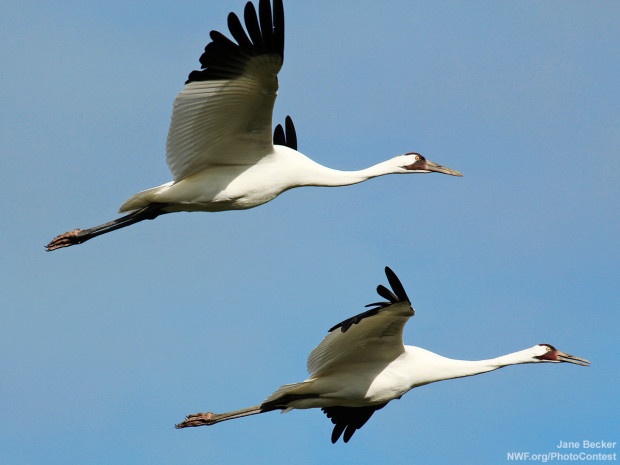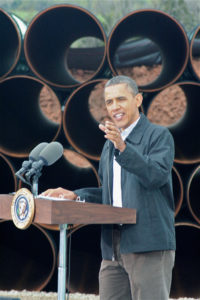We have much more to do and your continued support is needed now more than ever.
Keystone Rejected: A Huge Win for People and Wildlife
President Obama took an historic step to help protect wildlife from destructive, climate disrupting tar sands oil and extreme fossil fuels. On November 6, he rejected the ill-conceived Keystone XL pipeline. KXL would have threatened wildlife every step of the way.
Monumental Victory Deserving of Much Gratitude
The President deserves an enormous thank you for standing up for wildlife against destructive fossil fuel extraction.

Your voice ensured the threats to wildlife Keystone XL would pose from tar sands drilling and mining, tar sands oil spills, and climate impacts were taken into account.
The time and effort you spent attending hearings, weighing in with elected officials, talking to your neighbors, writing letters to the editor, sending in written comments, and demanding wildlife be protected has paid off.

An Historic Event
The movement that brought us here shows how people can change the debate about wildlife and our energy future. Prior to this decision, harmful fossil fuel projects got the green light, few questions asked.
But this time it was different.
Rather than accept the unacceptable – soon after this tar sands pipeline was proposed, people started asking questions. The answers soon revealed that tar sands oil and pipelines like KXL are part of an energy future that wildlife and our children can’t afford.
Keystone XL and tar sands oil are the wrong direction for our energy future. Tar sands oil must be strip mined or drilled from the ground in the biologically productive and pristine evergreen forests of Alberta. The result is that a vast migratory bird breeding ground and haven for caribou, wolves, and bear is being transformed into a poisoned moonscape.
Extracting tar sands oil is also extremely water intensive – consuming almost 3 barrels of water for every barrel of tar sands oil. (For comparison, conventional crude uses about 0.1 to 0.3 barrels of water per barrel of oil). The result of all of this water use is the dewatering of a landscape and the creation of toxic tailings ponds that can be seen from space. Toxic ponds have killed ducks and other waterfowl by the thousands, and are polluting nearby rivers.

Growing Momentum for Protecting Wildlife From the Impacts of Climate Change

2014 was the hottest year on record, according to both NASA and NOAA, and 2015 is shaping up to be another record-breaker. The last 38 years in a row were above the 20th century average, meaning no American born since the Carter administration has lived through a cooler-than-average year globally. Since the 1970s, each decade has been warmer than the last.
As the President said in rejecting Keystone XL, “we’re going to have to keep some fossil fuels in the ground” to protect our planet from the worst impacts of climate change.
Runaway climate change will have devastating impacts for wildlife, with potentially up to half of all species being threatened with extinction by climate upheaval. With increased floods and droughts, sea level rise, and ocean acidification already occurring, the time for action is now.
By rejecting Keystone XL, the Obama Administration has again shown it is committed to turning the tide and bringing about a brighter forecast for wildlife.
It’s a time to celebrate! Millions spoke up against long odds to demand a better future for wildlife. And President Obama heard us. Join us in thanking him!
Win for #wildlife! #KeystoneXL rejected. Please thank @POTUS https://t.co/HPiUCuI9sq pic.twitter.com/QE7en9hifI
— Wildlife Action (@wildlifeaction) November 6, 2015






















